
Hvis du leder efter udbyttevækst til en rimelig pris, er et af de bedste steder at starte Dividend Aristokraterne.
Undskyld. Vi mener ikke dem Udbytte aristokrater. Vi mener deres naboer på den anden side af dammen:de europæiske udbyttearistokrater.
The European Dividend Aristocrats, som navnet antyder, er en samling af europæiske udbytteaktier, der er anerkendt for deres konstante og voksende udbetalinger. Og denne delmængde af S&P Europe 350-indekset har en tendens til at skille sig meget mere ud end sine amerikanske modparter, da konsekvent stigende udbytte er meget mere usædvanligt i hele Europa.
Der er selvfølgelig forskelle. S&P 500 Dividend Aristocrats skal levere mindst 25 på hinanden følgende årlige udbytteforhøjelser. I modsætning hertil behøver europæiske udbyttearistokrater kun vise 10 år med stabil eller stigende udbytte.
For den 10-årige periode, der sluttede 2020, havde European Dividend Aristocrats genereret et årligt samlet afkast på 12,5 %, en respektabel præstation sammenlignet med 10 % afkastet fra benchmark Eurozone-indekset og 13,5 % afkast for amerikanske aristokrater. Men endnu vigtigere for værdisøgende – de europæiske udbyttearistokrater handler for en gennemsnitlig P/E på mindre end 16 i øjeblikket, mod mere end 19 for de amerikanske aristokrater.
Læs videre for at udforske alle 39 europæiske udbyttearistokrater. Hvis du overvejer at investere i nogen af følgende internationale udbytteaktier, skal du være opmærksom på, at alle aktier her har amerikansk-noterede aktier, men de er ikke alle helt ens. Nogle har noteringer på de store amerikanske børser. Andre handles "over-the-counter", men har stadig høj daglig volumen, hvilket betyder, at du sandsynligvis vil købe og sælge tæt på den pris, du ser noteret. Men nogle få har meget tyndt handlet OTC-aktier; hvis du køber dem, skal du bruge grænseordrer for at sikre, at du kommer ind til den pris, du rent faktisk ønsker.

Belgiens UCB (UCBJF, $96,43) er en biofarmaceutisk virksomhed, der er specialiseret i behandlinger af neurologiske og immunologiske sygdomme. UCBs mest kendte lægemidler omfatter Cimzia (autoimmun sygdom og inflammatorisk sygdom), Vimpat, Keppra og Briviact (epilepsi) og Neupro (Parkinsons sygdom). Lægemidler i sen udvikling omfatter bimekizumab (psoriasis) og dapirolizumab pegol og Staccato alprazolam (epileptiske anfald).
Virksomheden udvider sin pipeline via opkøb; i 2020 inkluderede det afsluttende køb af Ra Pharma og Engage Therapeutics. Ra Pharma udvider UCB's lederskab inden for behandlinger af myasthenia gravis, og Engage leverer nyt epilepsilægemiddel.
En stærk præstation fra UCB's lægemiddelportefølje gav næring til 9 % salgsgevinster og 3 % kerne EPS-vækst i 2021. Virksomheden er vejledende for 2021 EPS varierende fra €5,60-€6,10, en stigning på 12,5% år-over-år ved midtpunktet.
Virksomheden forventer at nå toppen af salget for Vimpat i 2022, Cimzia i 2024 og Briviact i 2026. Udvidelse af salget af nyere lægemidler giver masser af bane for den samlede salgsvækst.
UCB er blandt de nyeste europæiske udbyttearistokrater. Det har betalt udbytte siden 2006 og har støt hævet sin udbetaling siden 2010, inklusive en stigning på 2,5 % i 2020.

Givaudan (GVDNY, $79,15) er en schweizisk producent og forhandler af dufte og produkter til personlig pleje samt smagsstoffer, drikkevarer og fødevarer. Det har den førende markedsandel inden for fine dufte.
Virksomheden markedsfører cirka 122.600 forskellige produkter og er fortsat stærkt fokuseret på at udvide sin produktlinje via R&D, som er i gang på 69 forskningscentre verden over. Givaudan har allerede 3.600 aktive patenter. Salget foregår over hele verden. Virksomheden genererer 58 % af sit salg i udviklede lande og 42 % af salget fra nye markeder.
På trods af pandemien leverede Givaudan en stærk præstation i 2020, hvor salget steg 4% og EBITDA steg med 10%. Generering af frie pengestrømme var fremragende med 12,8 % af salget. I løbet af de sidste fem år har virksomheden genereret næsten 5 % årlig salgsvækst og frit cash flow på i gennemsnit 12,6 % af salget.
Givaudan sigter mod en organisk salgsvækst på 4% til 5% årligt, hvilket det sigter mod at opnå ved at udvide sin produktportefølje til nye områder som ernæring, fødevareingredienser og skønhed og udnytte sit markedslederskab i Kina.
Givaudans udbytte er steget hvert år siden 2009, med en årlig vækst på over 3,5 % årligt over de seneste fem år. Det inkluderer en forbedring på 3,2 % i 2020. På grund af sin fremragende frie pengestrømsgenerering er Givaudan komfortabel med en relativt høj udbetaling på 80 % fra indtjening.

Schweiziske RE (SSREY, 25,22 USD) er en førende verdensomspændende grossist af genforsikring og forsikring. Virksomheden sælger direkte og gennem mæglere til cirka 2.300 kunder over hele verden, herunder forsikringsselskaber, mellemstore til store selskaber og statslige agenturer. Det opererer gennem 80 kontorer globalt, der markedsfører ejendoms- og ulykkesgenforsikring, livs- og sundhedsgenforsikring og blandede løsninger til erhvervskunder.
I sit Ejendoms- og ulykkessegment arbejder Swiss RE på at udvide forsikringsmarginerne for at kompensere for lavere renter. Virksomheden sigter mod en combined ratio på 96 % i 2021. I sin Life &Health-forretning er dets fokus at skabe ny forretning, især i Asien, og lægge et fundament for fremtidig vækst i indtjeningen. Selskabets nye digitale forsikringsplatform, iptiQ, bidrager til denne indsats. IptiQ har allerede sikret sig 40 distributionspartnere, 500.000 kunder og over $300 millioner i bruttopræmier.
Selvom COVID-påvirkninger fik schweiziske RE til at notere et nettotab i løbet af 2020, begyndte virksomheden at vende tilbage til profitabel vækst fra september-kvartalet. Swiss Re rapporterede et tab for hele året på $878 millioner; Ved at støtte COVID-19-relaterede krav og reserver var nettoindkomsten $2,2 milliarder, hvilket var væsentligt højere i forhold til 2019's $727 millioner. Og tilbage i løbet af september-kvartalet lukkede virksomheden et virksomhedssalg, der resulterede i en udbyttebetaling på 1,5 milliarder USD til Swiss Re.
Denne europæiske udbyttearistokrat har udbetalt årlige udbytter siden 1994 og øget sin udbetaling med 5 % i 2020 efter at have øget den med 12 % i 2019.

Partnergruppe (PGPHF, $1.365,00) er et schweizisk private equity-selskab, der betjener omkring 900 institutionelle kunder og administrerer ca. $109 milliarder af aktiver. Virksomheden investerer i privat gæld, fast ejendom, infrastruktur og egenkapital på tværs af en række forskellige geografier og brancher. Det investerer hovedsageligt i ikke-cykliske industri-, sundheds- og farmaceutiske outsourcingsvirksomheder.
Som private equity-investor rangerer Partners Group i den øverste række af globale buyout-forvaltere.
Virksomhedens aktiver under forvaltning er steget hvert år siden dets børsnotering i 2006 (IPO). I løbet af 2020 steg Partner Groups aktiver under forvaltning med 11 %, og 16 milliarder USD i nye kundemidler strømmede ind i virksomheden. Virksomheden forventer, at tilgangen i 2021 vil variere fra $16 milliarder til $20 milliarder og forventer, at den gradvise lempelse af COVID-relaterede usikkerheder vil øge efterspørgslen på private equity-markedet.
Partner Group rapporterede et fald på 12 % i omsætningen i løbet af 2020. Det var hovedsageligt et resultat af faldende præstationsgebyrer, som var stærkt påvirket af COVID-19, selvom administrationsgebyrerne faktisk blev forbedret med 1 %. Alt i alt oplevede virksomheden et fald på omkring 11 % i overskud.
Partner Groups udbytte er steget hvert år siden 2008, med en vækst i det seneste årti på over 20 % årligt.

Experian (EXPGY, $35,03) er en irsk-amerikansk virksomhed, der er specialiseret i forbrugerkredit. Virksomheden vedligeholder kreditoplysninger om cirka 220 millioner amerikanske forbrugere og 40 millioner amerikanske virksomheder. Experian henter 63 % af omsætningen fra Nordamerika, 15 % fra Storbritannien og Irland, 14 % fra Latinamerika og 8 % fra Asien og Stillehavsområdet.
Virksomheden blev grundlagt som en kreditoplysningskilde for långivere og forbrugere, men har siden udvidet sin kundebase til at omfatte telekommunikation, offentlige myndigheder, bilforhandlere, hospitaler og andre industrier.
Experian voksede omsætningen med 9 % og EBIT 5 % i regnskabsåret 2020 og er kommet godt i gang i regnskabsåret 2021 på trods af pandemien. Omsætningen oversteg forventningerne og steg 9% i december kvartalet, drevet af bidrag fra virksomhedens nordamerikanske og asiatiske aktiviteter. Ledelsen forudser 2021 EBIT (indtjening før renter og skat) på mellem $1,35 milliarder til $1,38 milliarder, stort set fladt med $1,39 milliarder af EBIT produceret sidste år.
Experian hævede sit udbytte med 1 % i 2020. I år annoncerede det et midlertidigt udbytte på 15 cent, der skulle betales i februar 2021, som svarer til det midlertidige udbytte, der blev udbetalt sidste år.

Hexagon AB (HXGBY, $95,54) leverer højteknologiske værktøjer til geospatial kortlægning og industrielle applikationer.
Tjenester leveres på tværs af to segmenter; Industrial Enterprise Solutions Group bygger systemer, der giver præcise målinger, der er nødvendige for computerstøttet design, fremstilling og konstruktion. Geospatial Enterprise Solutions-segmentet bygger systemer, der fanger data fra land og luft, positionerer satellitter og genererer 3-D-kort og -modeller. Virksomheden har hovedkontor i Sverige og betjener kunder i 160 lande.
Landmåling er Hexagons største enkeltvirksomhed og tegner sig for omkring 20 % af salget.
Selvom Hexagons salg og indtjening faldt i 2020, opnåede virksomheden en rekordindtjening i december kvartalet og forbedrede sit cash flow. Kina og geospatiale tjenester var kvartalets primære vækstdrivere og leverede henholdsvis 25 % og 7 % organisk vækst. Hexagon forventer, at efterspørgslen fra sit industrisegment vender tilbage til normaliserede niveauer i 2021.
Selskabet øgede sit udbytte med 5 % i 2020 og foreslog også en aktiesplit på 7-til-1. Hexagon har leveret en årlig udbyttevækst på næsten 14 % over fem år.

FrankrigsHermès International (HESAY, $113,18) er en førende leverandør af luksustilbehør og lædervarer, der sælges gennem sit netværk af 311 boutique-butikker i 45 lande. Hermès blev grundlagt som sadelmager for over 180 år siden. International har udviklet sig til et førende luksusmærke, der genererer det meste af sit salg i Europa, Asien og USA
Efter en vanskelig start på 2020 forårsaget af COVID-relaterede nedlukninger, Hermès International vendte tilbage til vækst i løbet af septemberkvartalet, hvor salget steg 7% som følge af stærk kundetrafik i koncernens butikker, momentum i Asien og generelt forbedrede forhold i Europa og USA. For hele året faldt omsætningen med 6%.
Investeringsanalysefirmaet UBS fortalte for nylig sine kunder, at luksusmærker som Hermes øger markedsandelen i Kina og rangerede HESAY som et topvalg i luksusvaresektoren.
Selskabet holdt sit udbytte på €4,55 pr. aktie stabilt sidste år på grund af COVID. Tidligere har udbyttevæksten i gennemsnit ligget på næsten 11 % årligt. Som et par andre europæiske udbyttearistokrater, Hermès udbetaler også lejlighedsvis særligt udbytte.
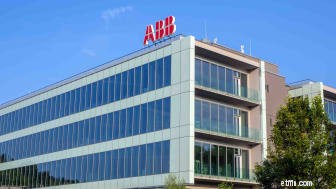
ABB (ABB, $31,21) fremstiller instrumenter, der bruges til elektrificering, industriel automation, bevægelse og robotteknologi og betjener kunder inden for forsynings-, industri-, transport- og infrastrukturindustrien. Dette schweiziske firma leverer infrastruktur til ladestationer til elektriske køretøjer, solenergiopvarmning, automatiseret distribution og andre højteknologiske applikationer.
ABB har markedsandele nr. 1, 2 eller 3 på de fleste af sine markeder og tæller Siemens (SIEGY), Emerson Electric (EMR), Honeywell (HON), Rockwell Automation (ROK) og General Electric (GE) blandt sine lang- stående kunder.
Tendenser, der driver ABB's langsigtede vækst, omfatter efterspørgsel efter elektricitet, der stiger dobbelt så hurtigt som andre energikilder, øget automatisering og fremstillingsapplikationer til kunstig intelligens.
ABB led et fald i omsætningen på 6 % i løbet af 2020 på grund af COVID-relaterede industrielle nedlukninger, men den grundlæggende EPS steg 261 % takket være en gevinst på 5,3 mia. ABB planlægger at returnere det kontante provenu på 7,6 milliarder USD fra salget til investorer, herunder via et nyt aktietilbagekøbsprogram på 4,3 milliarder USD.
I år planlægger ABB fuldt ud at decentralisere sine forretningsaktiviteter, hvilket skulle give 500 millioner USD årlige omkostningsbesparelser.
Selskabet udbetaler årligt udbytte. Selvom betalingerne ikke er steget hvert år, er udbyttet mere end tredoblet over en 14-årig tidsramme.

Storbritannien-baserede Ashtead Group (ASHTY, $249,75) driver en global udstyrsudlejningsvirksomhed med lokationer i hele USA, Storbritannien og Canada, primært under navnet Sunbelt Rentals. Virksomheden udlejer en række værktøjer og industrielt udstyr til over 745.000 kunder over hele verden inden for byggeri, forsyningsselskaber, infrastruktur, underholdning og beredskabsvirksomhed.
Dens Sunbelt US-forretning er Nordamerikas næststørste udstyrsvirksomhed. Det driver 840 butikker og bidrager med 86% af den samlede omsætning. Sunbelt har også 75 lokationer og en markedsandel på 4 % i Canada.
Virksomhedens britiske forretning er landets største udstyrslejer, driver 193 butikker og bidrager med 9 % af den samlede omsætning.
I løbet af regnskabsåret 2020, der sluttede i juni, voksede Ashtead Groups salg med 9%, drevet af 10% vækst i USA og 22% vækst i Canada. Virksomheden åbnede 105 nye butikker sidste år, hvilket understøttede en lille stigning i EPS og en fordobling af frie pengestrømme til rekordhøje £792 millioner.
Selvom COVID dæmpede resultaterne for første halvår 2021, var Ashtead Group i stand til at generere rekordfrit cash flow, hvilket lover godt for fremtidig udbyttevækst. Derudover reducerede virksomheden sin finansielle gearing til en beskeden 1,7 gange EBITDA (indtjening før renter, skat, afskrivninger og amortiseringer) og genoptog greenfield-udvidelsen ved at åbne tre nye butikker.
Ashtead Group hævede sit udbytte med 2 % i 2020 efter en kraftig stigning på 21 % i 2019. Udbetalinger foretages halvårligt.
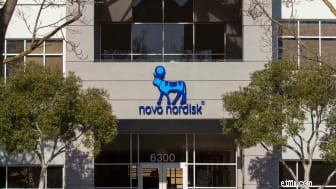
Danmarks Novo Nordisk (NVO, $67,89) har specialiseret sig i behandlinger af diabetes og fedme og udvikler også lægemidler til hæmofili og væksthormon-relaterede lidelser. Virksomheden leverer næsten halvdelen af verdens insulin fra produktionssteder i Brasilien, Kina, Danmark, Frankrig og USA.
Novo Nordisk har enorme adresserbare markeder. På verdensplan lever 463 millioner mennesker med diabetes, 650 millioner mennesker lider af fedme og 450.000 mennesker er ramt af hæmofili.
Virksomhedens strategiske mål for de næste fem år omfatter at øge sin andel af diabetesmarkedet til en tredjedel og fordoble salget på fedmemarkedet. Novo Nordisk øgede diabetessalget med 8% i 2020 og diabetesmarkedsandelen til 29%. Det samlede salg voksede 4%, EPS steg 10% og udbyttet steg 7% sidste år. Novo Nordisk forventer en salgsvækst på 5 % til 9 % og en vækst på 4 % til 8 % i overskud i 2021.
R&D-højdepunkter i december kvartal inkluderer en FDA-indsendelse for semaglutid, en diabetesbehandling én gang om ugen; en EU-ansøgning om en gang ugentlig vægtkontrolterapi; og lanceringen af et sent stadium af kliniske forsøg med et lægemiddel til Alzheimers sygdom. Virksomheden erhvervede også en proprietær teknologi til lægemiddellevering via købet af Emisphere.
Da diabetes er en kronisk tilstand, skaber Novo Nordisks insulinsalg robust tilbagevendende cashflow, der understøtter virksomhedens stærke F&U-investering og stigende udbyttebetalinger.
Novo Nordisk udbetaler udbytte halvårligt. I løbet af de sidste fem år har denne europæiske udbyttearistokrat vokset sit samlede udbytte med et sundt årligt klip på 12 %.

Storbritanniens M&G (MGPUF, $3,03) blev for nylig udskilt fra Prudential (PUK) og er placeret blandt verdens førende kapitalforvaltere og betjener mere end 5 millioner detailkunder og 800 institutionelle kunder over hele verden.
I Storbritannien og Europa tilbyder M&G en række langsigtede opsparings- og investeringsprodukter, herunder PruFund, en familie af fonde, der er målrettet mod langsigtet vækst med minimal volatilitet. I Nord- og Sydamerika, Afrika, Asien og Australien leverer virksomheden direkte formueforvaltningstjenester.
M&G er usædvanligt ved at være både ejer og forvalter af aktiver, investerer sammen med sine kunder og anvender kapital hurtigere end andre. Ud over at være en af Europas største kapitalforvaltere er M&G en af Storbritanniens største rentespecialister og en førende global forvalter af private aktiver.
The company benefits from global trends that include an aging world population and more than €10 trillion of investable cash held by European investors.
As part of Prudential, M&G delivered 15 years of rising dividends. In 2019, the company paid an ordinary dividend of 11.92 pence per share and a special demerger dividend of 3.85 pence. The company paid an interim 2020 dividend of 6.0 pence in August and plans to pay a 12.23-pence final dividend in April 2021.

Enagas (ENGGY, $11.10) is Spain's leading natural gas distributor, providing services via 11,000 kilometers of gas pipelines, three underground storage facilities and four regasification plants. In addition, Enagas holds a stake in a regasification plant in Mexico and a major gas pipeline and compressor station in South America. The company also has investments in a LNG terminal in Chile and a gas transportation businesses in Peru.
Enagas' biggest equity partnership is the construction of the Trans Adriatic Pipeline (TAP), which will bring gas to Europe from the Caspian Sea. After nearly five years of construction, commercial operations of the Trans Adriatic Pipeline commenced in November 2020, which should provide a nice boost to Engas' 2021 revenues and earnings.
The company is also an investor in Greek gas operator DESFA and Tallgrass Energy, a U.S. company that owns 11,000 kilometers of gas transmission pipelines.
During 2020, reduced demand for natural gas and electricity trimmed roughly 6% from Enagas' sales, but net profits rose 5% due to good expense controls and favorable exchange rates. The company has a strong balance sheet for a utility, with BBB+ debt ratings from both Fitch and Standards &Poor's and no significant debt maturities before 2022.
Enagas raised its dividend by nearly 3% in 2020 and also paid a modest special dividend.

Belgian holding company Groupe Bruxelles Lambert (GBLBY, $10.54) is one of Europe's largest investment firms. It holds sizable stakes in industry-leading companies such as Adidas (ADDYY) and Pernod Richard (PRDDF). A second business, Sienna Group, invests across leading fund managers. The overall value of the company's investment portfolio exceeded €18.9 billion in 2020.
During the first nine months of 2020, lower earnings from portfolio companies reduced GBL's net asset value and triggered a 29% decline in cash earnings. Despite this, the company's financial position remains solid. GBL has credit ratings of A+ and A1 from S&P and Moody's, respectively, and is one of Europe' highest rated investment managers.
The company has plenty of cash for investments and recently acquired a majority stake in Canyon, Germany's leading manufacturer of premium bicycles and electric bikes. Canyon has been growing sales more than 25% annually.
Over the past 15 years, the company has hiked its dividend 4.6% annually while also returning €5.9 billion to shareholders

British Intertek Group (IKTSY, $82.32) offers product testing, quality assurance and certification services through a network of more than 1,000 labs across over 100 countries. The company is the largest tester of consumer goods worldwide, serving customers in the construction, healthcare, food production and transportation industries.
Intertek Group has an impressive track record for consistent growth showing 10% annual sales gains and 11% yearly EPS gains since its 2002 IPO. Over the same period, dividends have expanded at a 16% annual rate, the highest dividend growth rate among the FTSE 100 companies.
Due to COVID impacts, Intertek reported a 6.7% revenue decline in 2020 on a constant-currency basis. Adjusted earnings dropped by a considerable 18.1%.
However, Intertek Group sees growth opportunities increasing due to the world's post-COVID focus on safety and sustainability, increased regulations and population growth.
The company's dividend growth over the past decade has averaged nearly 13% annually. Intertek Group paid a full-year dividend of 105.8 pence that was in line with 2019.
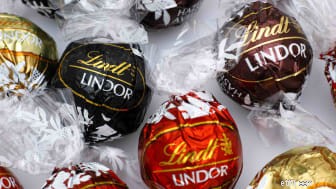
Founded over 175 years ago, Swiss chocolate-maker Lindt &Sprungli (LDSVF, $8,597.15) is the global leader in premium chocolates. The company sells its products under the Lindt, Hofbauer, Kufferle, Ghiradelli, Whitman's and Russell Stover brands. Sales are made through 500 company-owned shops worldwide that serve more than 80 million visitors a year and through other retail and e-commerce channels.
In the U.S., the world's largest chocolate market, Lindt has the No. 1 market share in the premium chocolate segment and is No. 3 in overall chocolate sales. The company is expanding its U.S. production facilities to support planned volume growth and making upgrades to its logistics network serving U.S. customers.
Lindt &Sprungli is guiding for a 5-7% sales decline in 2020 as a result of COVID-related temporary store shutdowns, but targets a return to 5% annual organic sales growth and improved EBIT margins in 2021.
The European Dividend Aristocrat's payout rose 5% in 2020 and Lindt &Sprungli also paid a modest special dividend. Dividend growth over the past decade has averaged around 7% annually.

Britain's Croda International (COIHY, $45.19) produces high-performance specialty chemicals used in personal care products, as well as in life sciences, performance technologies and industrial applications. The company operates in 38 countries and serves more than 17,000 customers. New patented or protected products contribute nearly 30% of Croda's annual sales.
Croda is developing new personal care products that address consumer demand for greater transparency of ingredients and life sciences products that boost food production. In addition, the company supplies excipients used by Pfizer in its COVID vaccine.
Croda's full-year sales actually improved by 1.1% on a constant-currency basis despite a difficult first six months of 2020. Free cash flow declined by 12.3%.
Croda International has increased dividends every year since 2001. Dividends are paid semi-annually, and the company occasionally also pays a special dividend. Croda marginally hiked its dividend in 2020 while maintaining payout at approximately 55%.

Dublin-based DCC (DCCPF, $81.89) operates large LPG (liquified petroleum gas) sales and marketing operations across the US, Europe and Asia and has a developing business in retail sales of natural gas and electricity. The company also deals in commercial fuels and heating oil and has profitable healthcare and technology businesses. DCC is a member of the FTSE 100 and has annual revenues exceeding £14.8 billion.
In its LPG operations, DCC has established a stable platform for further growth in Germany, Asia and the U.S. while venturing into adjacent fuel markets like natural gas and electricity that leverage its infrastructure and globally recognized brands.
DCC has delivered 14.5% annual growth in operating profits and 14% dividend growth over 26 years. During the six months ended in September, DCC's operating profits rose nearly 9%, fueled by strong contributions from its healthcare business. It has not yet released its full-year results.
DCC has paid a rising dividend every year since 2004. Dividends are paid semi-annually and rose 5% in fiscal 2020.
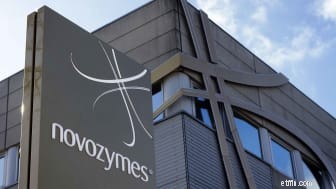
Danish Novozymes (NVZMY, $62.84) develops industrial enzymes and micro-organisms used in crop production, animal health, food and beverages and cleaning solutions. The company estimate 5.6 billion people worldwide use products containing Novozymes enzymes on a weekly basis.
Novozymes' sales were flat in 2020 and EPS declined 9% as a result of COVID-19 impacts on ethanol and textile production, which were partially offset by increased demand in household care products and from emerging markets. Novozymes launched Biofresh, a treatment for bad breath, last year, which was one of 18 new products launched in 2020. The company also closed two small acquisitions in the human health area.
Novozymes is targeting 2% to 6% organic sales growth in 2021, accompanied by 4% higher free cash flow.
The European Dividend Aristocrat aims to pay out 50% of earnings as dividends and returns excess cash to investors via share repurchases. Novozymes opted to hold its dividend steady at DKK 5.25 per share in 2020, which increased payout slightly to 52%. Over the past five years, Novozymes' dividend has grown approximately 12% annually.

BAE Systems (BAESY, $29.27) is Britain's largest defense contractor and a major supplier of weapons to the U.S. military. The company' derives 52% of revenues from sales of military aircraft, 26% from submarines and warships, and 17% from land-based combat vehicles. BAE also has a small but growing cybersecurity business. The U.S. military is BAE's principal customer, accounting for over 40% of sales. The company supplies Typhoon combat aircraft, subassemblies for F-35 fighters, submarines and warships to the U.S. military.
The company's revenues improved by nearly 4% in 2020, and adjusted earnings ticked 2.1% higher. Free cash flow jumped 60.8%, though that does exclude the impact of a large pension contribution in 2020. BAE's growth was fueled by increased sales of F-35s, land combat vehicles and electronic defense systems, partially offset continued weakness in the commercial portfolio.
BAE Systems has increased dividends every year since 1999, with the exception of 2019 when the company paid an interim but no final dividend. Nonetheless, it maintains its membership in the European Dividend Aristocrats with more than two decades of payout stability and growth.

Consumer products giant Unileve r (UL, $56.69) sells food, beauty care and personal care products used by over 2.5 billion consumers worldwide. The company is a dominant player in many product lines, with 81% of its brands ranking No. 1 or No. 2 in their markets. Unilever brands include Dove soap, Lipton tea, Hellmann's mayo, Breyer's and Ben &Jerry's ice creams, Tresemmé shampoo and Pond's and Noxzema skin softeners. Twelve of the company's brands generate sales greater than €1 billion ($1.1 billion) annually.
Unilever originally consisted of Dutch and U.K. subsidiaries, but the company consolidated its operations into a single entity in 2020. This operational streamlining is expected to reduce costs and make the business more agile.
The company's strategies for growth include expanding in emerging markets and growing its sustainable business, which consists of products (such as cleansers and detergents) that are biodegradable and less polluting.
Unilever's sales rose 2% in 2020 as a result of demand for home hygiene products and in-home foods that more than offset lower sales in other categories. Underlying EPS on a constant currency basis improved 4%. Over the longer-term Unilever is targeting 3% to 5% annual sales gains, profit growth that exceeds sales growth, sustainable strong free cash flow and over £2.0 billion of annual cost savings from its "Fuel for Growth" program.
Unilever pays quarterly dividends. The annual dividends grew 4% last year, and the European Dividend Aristocrat has already raised its quarterly dividend 6% in early 2021.
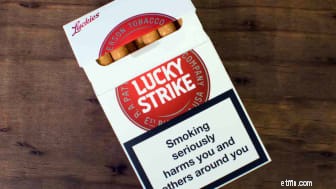
British American Tobacco (BTI, $38.65) holds the No. 2 share of the U.S. tobacco market and is a market leader in 50 countries. The company owned popular brands like Dunhill, Kent, Lucky Strike, Pall Mall and Rothmans and added the Newport, Camel and Natural American Spirit brands through the 2017 acquisition of Reynolds American.
BAT plans to offset declining cigarette volume by growing sales of its vaping, tobacco heating and modern oral tobacco products. The company's Vuse and Vype e-cigarettes are market leaders in the U.S., Canada and Europe. And its Velo and Lyft modern oral tobacco products are rapidly gaining share in Europe and the U.S.
During the first six months of 2020, BAT's adjusted EPS improved 7% as a result of an improved cigarette price/sales mix and an increased contribution from non-combustible tobacco categories, which rose 71% year-over-year. The company's preliminary 2020 results include a 0.4% decline in revenues, but 5.5% gains in adjusted EPS.
At present, the U.S. is the world's largest vaping market (12 million customers) and BAT anticipates the number of U.S. vaping customers will rise to 50 million by 2030. The company expanded its portfolio of modern oral tobacco products last November by acquiring the Dryft Modern Oral business, which will be rebranded with its Velo name.
This European Dividend Aristocrat transitioned from semi-annual to quarterly dividends in 2018 and increased dividend payments 4% in 2020.

UK-based Diageo (DEO, $169.66) is a global alcoholic beverage company making sales in over 180 countries. The company owns popular brands including Crown Royal and Johnny Walker (whisky), Captain Morgan (rum), Smirnoff (vodka), Tanqueray and Gordons (gin), Bailys (liqueur) and Guinness (beer).
Diageo plans to boost profits by expanding the premium content of its portfolio. It has recently entered new super-premium segments via the acquisition of Aviation American Gin, one of the fastest growing gin brands in the U.S. and the Davos brand portfolio, which includes Astral Tequila, Sombra Mezcal and TYKU Sake. In addition, Diageo plans to acquire the Chase Distillery, which produces Chase GB Gin and Chase Original Potato Vodka. U.K. demand for premium gins is growing twice as fast as the overall gin market.
Diageo achieved 1% organic sales growth during the six months ending in December, fueled by a favorable performance from its North American business. Operating profit fell 3% due to a less favorable channel and category mix.
Dividends are paid semi-annually. Diageo hiked 2020 dividends by 2% and announced an interim dividend payable in April 2021 that is 2% higher than last year. It's among a cadre of European Dividend Aristocrats that have provided steady or higher dividends for more than two decades.

Legal &General Group (LGGNF, $4.10) provides insurance products and services to customers in the U.S. and U.K. The company is the U.K. market leader in risk management and one of Europe's largest asset managers with more than £1 trillion of assets under management.
Its U.S. retirement products business has been a growth catalyst in 2020, contributing 40% growth and $1.6 billion worth of pension risk transfer transactions during the year. In addition, the company's U.S. reinsurance volume has been steadily increasing, with over $5 billion in volume written since 2015. The U.S. retirement products business experienced its strongest September quarter ever in 2020 and has plenty of room to run, given an addressable market estimated at $3 trillion.
Full-year operating profits, however, were flat despite growth in three of its five businesses.
Prior to 2020, Legal &General Group had generated 125% growth in operating profits, 131% EPS gains and 175% dividend growth since 2011. Its fastest-growing businesses – retirement solutions and pension risk transfer – have produced better than 20% annual growth.
Although the company plans to hold its 2020 dividend steady, Legal &General Group targets 3% to 6% annual dividend growth in 2021 and beyond.
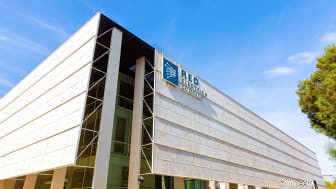
Spanish utility Red Eléctrica (RDEIY, $8.86) operates regulated electricity transmission and telecommunication businesses in Spain and internationally. The company owns nearly all of Spain's power grid, has a growing Latin American infrastructure business and recently expanded its telecom operations by acquiring one of Spain's leading communications satellite operators.
Red Eléctrica stepped up investments in international electricity infrastructure during 2020 via an acquisition in Brazil and development projects in Chile and Peru. In addition, the company is building a telecommunications satellite scheduled to launch in 2022. This satellite will provide coverage of the continental US, North Atlantic corridor and Greenland.
The company's net profits fell 4% on a 1% sales decline during the first nine months of 2020 as a result of reduced demand for electricity during COVID business shutdowns and regulatory adjustments that lowered Red Electricia's billable fees.
Red Eléctrica plans to invest €6.4 billion in electricity transmission infrastructure over the next five years and is seeking approval for its plan from EU authorities. Over 60% of the company's proposed spending is for renewables and international interconnections.
Like many European Dividend Aristocrats, RDEIY's dividends are paid semi-annually. It delivered a final dividend of 78 cents per share in 2020, up nearly 10% from one year earlier, but no interim dividend. An interim dividend of 27 cents was paid in January 2021. Annual dividend growth over five years has averaged approximately 8%.
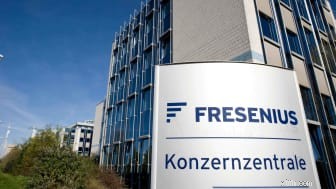
Based in Germany, Fresenius Medical Care (FMS, $37.15) is the world's leading provider of products and services for patients experiencing chronic kidney failure. The company provides dialysis services to nearly 350,000 patients worldwide through its network of 4,000 dialysis clinics. Fresenius is also the market leader in dialysis-related products such as hemodialysis machines and disposables.
Long-term growth drivers for the company's business include an aging global population, increasing incidences of diabetes and high blood pressure, and better-quality treatments. North America represents 70% of the company's revenues.
The company's revenues rose 5% on a constant currency basis during 2020 and adjusted net income improved 12%. Free cash flow surged 120% to €3.2 billion as a result of advanced payments under the CARES Act and other COVID relief and lower U.S. tax payments. Fresenius is guiding for lower 2021 EPS due to COVID effects but sees high single-digit earnings growth through 2025.
Dividend payments are made annually and the company plans to pay a €1.34 dividend in May, up 12% from last year and marking its 23rd consecutive year of dividend growth – good enough to put it among the top half of European Dividend Aristocrats by streak length.

England's Imperial Brands (IMBBY, $20.91) through its subsidiary Imperial Tobacco sells tobacco and e-vaping products worldwide. It is the world's fourth-largest tobacco company thanks to prominent brands that include John Player Special, Winston, Gauloises, Kool, West and Fine cigarettes, Montecristo and Habana cigars, and Blu e-cigarettes. Sales are made in 160 countries with the U.S., Germany, the U.K., Australia and Spain accounting for nearly 75% of operating profits.
The company anticipates its future growth will come from its next generation vaping, heated tobacco and oral nicotine products, which are expected to account for 20% of the nicotine market by 2025.
Imperial Brand's sales were relatively flat in fiscal 2020 ended in September; adjusted EPS declined 6% as a result of lower tobacco profits, increased regulatory costs and losses in the evolving next generation product category. The company sold its premium cigar business last year, used the proceeds to reduce debt, and converted 127% of earnings to cash. Imperial Brands is guiding for low to middle-single digit operating profit growth in 2021.
The European Dividend Aristocrat revised its dividend policy last May to prioritize debt reduction. However, the company has paid dividends continuously since 1997 and is committed to resuming dividend growth in the future. Over the past decade, dividends have grown nearly 6% annually.

Spirax-Sarco Engineering (SPXSF, $163.25) is a U.K. -based manufacturer of industrial and commercial steam systems, electric heating and temperature management solutions and fluid transfer pumps and related technology. The company is a global leader in steam systems and benefits from its resilient business model, which derives roughly 85% of revenues from essential maintenance and repair services for customers.
Revenues declined 4% in 2020, including by 3% on an organic basis. Adjusted basic earnings per share were off by 3% as well.
SPXSF already sells direct in 66 countries and anticipates future growth will come from increasing safety and clean energy regulatory requirements worldwide, geographic expansion, new products and bolt-on acquisitions.
The European Dividend Aristocrat offers an annual payout that improved 10% in 2020 and has risen every year since 1998.

Denmark's Coloplast (CLPBY, $15.05) develops and markets intimate healthcare products and services. It markets ostomy products and accessories under the Sensura and Brava brands, continence care products under the Speedicath, Persisteen and Conveen brands and wound care products under the Biatain brand.
Coloplast holds the leading global market share in ostomy and incontinence care and No. 4 and No. 5 market shares in interventional urology and wound care, respectively. Nearly 60% of Coloplast's sales are made in Europe, 24% are from other developed countries and 17% are from emerging markets.
Despite 2020 challenges due to the cancellation of many elective medical procedures, Coloplast's organic sales grew 4% and EBIT increased 5%. The company also launched its new Strive 25 corporate strategy that aims to increase efficiency via production line automation. This initiative also supports the company's goal of 7% to 8% organic sales growth.
The chronic care markets served by Coloplast provide recurring revenues and stable growth. Coloplast recently entered the $1 billion market for over-active bladder products by acquiring Nine Continents Medical, which is developing an implantable device for treating over-active bladder. This device could seek FDA approval as early as 2024.
Coloplast pays dividends semi-annually and grew payments 6% in 2020.

Swiss healthcare company Novartis (NVS, $86.30) is known for its blockbuster drugs Costentyx (arthritis), Gilenya (neurology) and Entresto (heart failure). Its portfolio includes five blockbuster drugs, each generating more than $1 billion of annual sales. The company has more than 40 new compounds in development and secured FDA approvals to commercialize 26 new treatments during 2020.
Novartis' sales from continuing operations rose 3% in 2020, driven by increased sales of Entresto, Zolgensma and Costentyx, which were partially offset by lower demand for ophthalmology, dermatology and consumer retail products. Net income from continuing operations grew 20% and 2020 free cash flow was 10% lower but still healthy at $11. 7 billion.
Novartis is guiding for low- to mid-single-digit sales growth in 2021 and mid-single digit operating income growth.
The European Dividend Aristocrat increased its dividend 2% in 2020, representing the 24th consecutive year of dividend increases since Novartis' founding in 1996.

Sage Group (SGPYY, $35.14) provides IT solutions to small and medium-sized businesses and serves millions of customers worldwide. This UK-based company offers cloud-based software tools for accounting, financial management, enterprise planning, HR, payroll and payment processing. The company benefits from spending on cloud-based software estimated to grow 11% annually and create a $33 billion addressable market comprised of 69 million small businesses over the next five years.
While Sage Group faces cost challenges recently from customers migrating to the cloud, the company enjoys 90% recurring revenues, excellent free cash flow conversion (123% of earnings) and a resilient balance sheet showing £1.2 billion of cash and investments and a 0.3% ratio of net debt-to-EBITDA.
Sage Group's organic sales rose 4% in 2020 and recurring revenues increased 8%, but operating profit declined 4% due to rising marketing costs. Sage Group targets 3% to 5% growth in recurring revenues in 2021, but lower operating profits due to increased investments in marketing and product development.
Sage Group pays dividends semi-annually. The European Dividend Aristocrat's total payout rose 2% in 2020 and dividends have increased every year since 2005.

Swiss food giant Nestlé (NSRGY, $115.47) is the world's largest food and beverage conglomerate. Its iconic brands include Stouffer's (frozen entries), Purina (pet food), Perrier and Poland Spring (water), Nescafé (coffee), Lean Cuisine (ready-to-eat meals), Haagen-Dazs (ice cream), and Gerber (baby food). Nestle's portfolio includes 34 brands that each generate over CHF 1 billion ($1.12 billion) in annual sales.
The company plans to boost profits by expanding in higher-growth categories such as coffee, pet care, infant nutrition, water and nutritional health. Nestlé also actively manages its portfolio and has acquired or divested more than 50 businesses since 2017. Recent acquisitions include Starbuck's consumer packaged tea and coffee business. Divestitures consisted of Nestle shedding its under-performing USA Confectionery and Gerber life insurance businesses last year.
In 2020, Nestlé's organic sales rose 3.6%, mainly as a result of strong growth in its premium pet food business. Underlying earnings improved by 3.5% on a constant-currency basis.
Nestlé positioned for higher growth in nutritional health products in 2021 by acquiring new collagen products, medical foods and treatments for life-threatening food allergies last year.
Nestlé is one of the oldest dividend payers among the European Dividend Aristocrats; the company has been paying dividends continuously since 1959. Nestlé's dividends grew 10% in 2020 to $2.70 per share.

British Bunzl (BZLFY, $32.79) benefited from robust COVID-related demand for cleaning products in 2020. The company is a leading distributor of cleaning solutions, safety equipment and healthcare consumable products. Its sales of masks, sanitizers, gloves, disinfectants, face shields and related equipment more than doubled last year, and was only partially offset by reduce demand from foodservice customers.
Much of the company's recent growth has come from acquisitions. Bunzl has closed roughly 160 acquisitions since 2004, in the process extending its reach to 31 countries. Transactions from 2020 included the purchase of a Canadian hygiene products company and a Brazilian distributor of protective equipment.
Bunzl's revenues grew by 9.4% on a constant-currency basis in 2020, while adjusted earnings shot 26.6% higher. Meanwhile, it grew the dividend from 51.3 pence to 54.1 pence – a 5.5% improvement. Bunzl has posted 27 consecutive years of dividend increases with annual dividend growth ranging around 10%.

EssilorLuxottica (ESLOY, $80.99) is the world's leading designer and manufacturer of ophthalmic lenses, frames and sunglasses. Headquartered in Paris, the company owns the Ray-Ban, Oakley, Varilux and Transitions eyewear brands and sells direct to consumers through its Sunglass Hut and LensCrafter retail stores. The business was created when lens manufacturer Essilor merged with eyeglass frame maker Luxottica in 2018 and retail stores were added to the mix by purchasing Dutch optical company Grandvision.
Essilor announced a collaboration with Facebook in September to develop Ray-Ban branded "smart" glasses, which will be available in stores beginning in 2021.
COVID-related store shutdowns triggered a 20% decline in Essilor's revenues during the first nine months of 2020, although sales rebounded in the September quarter. E-commerce was a particularly bright spot with September quarter e-commerce revenues up 40% year-to-date.
EssilorLuxottica, which has been among the European Dividend Aristocrats for more than a quarter-century, grew its dividend 35% in 2019 and paid an interim dividend of €1.15 in December 2020. A final dividend has not yet been announced.
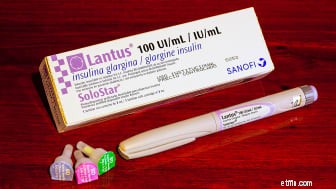
French drug-maker Sanofi (SNY, $49.97) specializes in medicines for diabetes, rare blood disorders, immune disorders, cancer and multiple sclerosis. The company also produces vaccines. Sanofi's blockbuster drugs include Lantus (diabetes), Dupixent (atopic dermatitis), Aubagio (multiple sclerosis) and Lovenox (cardiovascular). While Latus sales are declining due to generic competition, Sanofi is offsetting this decline with newer drugs like Dupixent, which grew revenues 74% in 2020.
The company's sales rose 3% in 2020, driven by Dupixent and influenza vaccine sales. Reported EPS was 338% higher due to capital gains from the company's sale of its stake in Regeneron. On an adjusted basis, EPS improved 4%. Sanofi is guiding for high-single-digit EPS growth in 2021.
In January, the company announced plans to acquire Kymab for a $1.1 billion payment upfront and $350 million of milestone payments. Kymab is developing a novel monoclonal antibody that treats a variety of immune disorders and inflammatory diseases.
The European Dividend Aristocrat paid a €3.20 dividend in 2020, up 2% from the prior year, and delivered its 27th consecutive year of dividend growth.
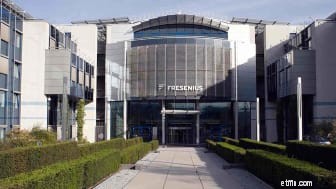
Germany's Fresenius SE (FSNUY, $11.49) is a global leader in healthcare services. The company owns a network of hospitals, a hospital supply business and a project management and construction business serving hospital groups. It also owns a 31% stake in dialysis-services provider Fresenius Medical Care.
Fresenius SE is the largest private hospital operator in Europe based on a network of 89 acute care hospitals, 128 outpatient clinics and six prevention centers that together treat 15.4 million patients annually.
In fiscal 2020, sales improved by 5%, but EBIT (earnings before interest and taxes) were level, and earnings per share declined by 3%.
The company has delivered an impressive 27 consecutive years of dividend growth. Dividends rose 12% in 2020 and growth over five years has exceeded 15% annually.

Dutch IT firm Wolters Kluwer (WTKWY, $89.48) provides professional information and software solutions and services for customers in the healthcare, tax and accounting, corporate governance, legal and regulatory industries. The company sells to customers in 180 countries, and derives roughly 62% of revenues from North America, 30% from Europe and 8% from Asia Pacific.
Recurring revenues represent more than 80% of total revenues and provide Wolters Kluwer with enough flexibility to consistently invest 8% to 10% of sales in product development and pay a rising dividend. The company anticipates future growth will come from extending its product lines and distribution channels and making bolt-on acquisitions that are accretive to EPS.
Reflecting a strong contribution from recurring revenues, Wolters Kluwer's overall sales rose 1% during 2020, adjusted operating profits improved 5% and adjusted free cash flow increased 16% on a constant-currency basis.
The company introduced a COVID-19 Enterprise Solution in 2020, acquired two businesses (XCM Solutions and eOriginal) and divested its ComplyTrack healthcare regulatory risk management tool for an undisclosed amount.
Wolters Kluwer has improved its payout for more than three decades. The company established a progressive dividend policy in 2007 and switched from annual to semi-annual dividends in 2015. Dividends rose 20% in 2019. In 2020, the company paid a €0.47-per-share interim dividend that was 40% less than the prior-year interim dividend. However, a final dividend of €0.89 will result in total payouts of €1.36, up 15% year-over-year.

Ireland's Kerry Group (KRYAY, $131.10) is a leading developer and manufacturer of specialty ingredients used to improve the flavor, appearance and health benefits of packaged foods. The company has manufacturing facilities in 148 sites and sales in more than 150 countries.
Kerry Group is the global market leader in flavorings used in dairy, savory, cereal, beverage and nutritional supplements and also supplies ingredients for five of the world's top 10 blockbuster drugs.
The company's strategies for future growth focus on expanding sales channels and its customer base by entering adjacent markets such as snack foods and food-to-go solutions.
Although COVID negatively impacted the company's first-half 2020 results, the business recovered strongly in the September quarter, generating volume that approached prior year levels. Kerry also acquired a Canadian manufacturer of probiotics and a Chinese supplier of savory flavorings during the September quarter.
Its preliminary expectations for full-year 2020 include a 4.0% decline in revenues, and a 9.4% drop in adjusted EPS.
However, since its 1986 IPO, Kerry Group has generated 10% annual growth in sales, 13% yearly adjusted EPS gains and 17% annual dividend rises. Going forward, Kerry Group targets 10% or higher annual EPS and dividend growth.
The company raised its dividend 10% in 2020, extending its record of payout hikes and continuing its membership in the European Dividend Aristocrats.

Swiss pharmaceutical Roche Holdings (RHHBY, $40.63) is the world's largest biotech company and a leader in in-vitro diagnostics and tissue-based cancer diagnostics. The company owns many of the world's top-selling oncology drugs such as Avastin, Herceptin, Rituxan, Perjeta and Tecentriq.
Roche faces challenges from generic competition for some cancer drugs and aims to offset this impact with newer drugs like Ocrevus (multiple sclerosis), which Roche believes could replace nearly half of the lost cancer sales.
Roche introduced four new medicines in 2020 and has 19 new compounds in late-stage development. The company began a major player in the COVID-19 space during 2020 by launching 15 coronavirus diagnostic products and developing four different medicines for treating COVID-19 infections currently in clinical trials.
Roche's sales grew 1% in 2020 as a result of robust sales of COVID diagnostics, which more than offsetting lower pharmaceutical sales attributable to generic competition. Core EPS rose 4% and Roche is guiding for low to mid-single digit revenue and EPS growth and a rising dividend in 2021.
Roche increased its dividend 3% in 2020, extending its record to 18 consecutive years of payout hikes. All told, it has delivered more than three decades of dividend stability or growth.

French firm L'Oreal (LRLCY, $78.69) is a world leader in skin care, hair care and cosmetics. Its iconic brand portfolio includes the Lancôme Paris, Garnier and Maybelline brands. The company has the No. 1 global share in the cosmetics market, offering 36 different personal care brands across 150 countries. Its products are sold in hair salons, drug stores, big box stores and via the Internet.
Because of its strong brands, L'Oreal was able to outperform the overall beauty market in 2020. The company anticipates a return to growth in 2021, fueled by product launches, maximizing its digital presence and e-commerce channels and expanding its presence in China.
L'Oreal has grown dividends 8% annually over the past 10 years. Shareholders who have owned the stock more than two years also qualify for a 10% loyalty bonus dividend.

U.K.-based Halma (HLMAF, $33.20) provides technologies for the safety, health and environmental markets. Its product line includes instruments for detecting gas leaks, explosions and corrosion and fire detection and suppression systems. Halma derives the majority of its sales in the U.S. and Europe.
The company has generated 17 consecutive years of rising sales and profits, driven by new products and niche acquisitions. Over this period, revenues have risen 10% annually and profits have increased at an 11% annual rate. However, COVID business slowdowns have impacted 2020-21 results; Halma's sales and profits were each down 5% during the first six months of 2020-21.
Halma is the longest-tenured of the European Dividend Aristocrats at more than four decades of payout growth. The company raised its dividend 5% in 2020, extending its consistent record of 5% or higher annual dividend hikes. Analysts look for Halma to deliver 11% adjusted EPS growth and 5% dividend growth in 2020-21.
Hvornår er din virksomhed klar til at genåbne efter Covid-nedlukningen, og hvordan kan du genåbne sikkert?
5 organisationer, der hjælper minoritetsstartere med at få succes
Hvad er en formuerådgiver, og er de det værd?
Steder, hvor familier får flere børn – 2019-udgaven
Hvad du skal gøre for at beskytte din økonomi, når din ægtefælle har et hasardspilproblem